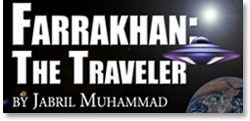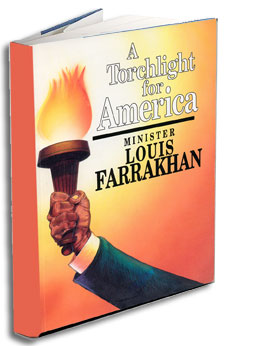
“As a middle-aged, college educated, white man I find it amazing that I cannot find criticism with Rev. Farrakhan. After all the propaganda against him, I was prepared to hate the man. Then, I actually read him. And I listened to his entire sermon on C-SPAN, not just once, but twice. The man speaks with righteousness–not self-righteousness, but the righteousness of God. From my own studies and sources, I know that he speaks the truth. If he has a hidden agenda other than speaking truth to power, I do not see it. This man has the Spirit within him and there is no guile to his words. I could have remained anonymous here, but I choose to acknowledge a great man.”
[S.C. Curtis, Customer Reviewer, Borders Online, Inc. and Amazon.com]
Section 19 of Surah 2 of the Holy Qur’an is entitled: “Hard Trials are necessary to establish Truth.”
Is Allah saying that the greater the truth to be established, the harder the trials that are required to establish that truth? If so, why? Many might start to answer with what they think is best to answers these questions. Others might start by answering these questions from the words of this or that scientist of this world.
My experience with the Honorable Minister Louis Farrakhan has been for decades that he starts with the Word of God, that Master Fard Muhammad revealed to the Honorable Elijah Muhammad, in one form or another.
In Jerold Aust’s writing entitled Profiles of Faith subtitled A Man After God’s Heart are these words:
“Most men do one thing well and call it enough. King David did many things well and was usually ready and eager to do more.”
[After taking up David’s victory over Goliath, Mr. Aust goes on.]
“No Israelite dared face the giant. This situation infuriated David. ‘What shall be done for the man who kills this Philistine and takes away the reproach from Israel?’ he demanded. ‘For who is this uncircumcised Philistine, that he should defy the armies of the living God?’ (I Samuel 17:26).
“The events that immediately followed became a legend.

Store.FinalCall.com
“How did this young man, whose background included herding sheep, writing poetry and playing and singing songs under starry skies, become a fearless, valiant warrior?
“Let’s consider how David matured into the most renowned of Israel’s kings.
“David’s accomplishments were many. He captured Jerusalem, making it the national capital, and reunited the nation. In a 40-year span, he controlled an empire that stretched from Egypt to Mesopotamia. A man of many talents, he was a shepherd, poet, musician, warrior and statesman and an administrator who set a standard for the later kings of Israel and Judah.
“As the youngest of eight sons of Jesse, his job was to tend sheep. Shepherding meant lonely vigils as well as opportunities to come to know God in an intimate relationship that developed throughout David’s life.
“The story of David’s ascent to the crown began rather unceremoniously. It all started when God sent Samuel to anoint a replacement for King Saul. Saul had disqualified himself to rule; God decided on another man: young David.
“Outward appearance secondary
“God directed Samuel to go to the abode of Jesse, where he would anoint a king from among Jesse’s sons. Samuel did as he was told, then began to take stock of each son. ‘So it was, when they came, that he looked at Eliab and said, “Surely the LORD’s anointed is before Him” (I Samuel 16:6). Samuel reasoned the way so many of us do: He was certain that Jesse’s oldest son, Eliab, with his confident bearing, height and impressive good looks, was the one God would choose.
“‘But the LORD said to Samuel, “Do not look at his appearance or at his physical stature, because I have refused him. For the LORD does not see as man sees; for man looks at the outward appearance, but the LORD looks at the heart.”’ (ISamuel 16:7, emphasis added throughout).
“To God, the heart–a person’s innermost motivation and attitude–is of prime importance: ‘But on this one will I look: On him who is poor and of a contrite spirit, and who trembles at My word” (Isaiah 66:2). Eliab’s regal appearance didn’t qualify him to become Israel’s next king. David’s heart did.”
[Then, a few lines down, we read:]
“From these humble beginnings came Israel’s greatest king. David’s early training had taught him to herd sheep; now God would teach him to lead a nation.”
***
There should be no doubt in the mind of anyone who calls himself or herself acquainted with the Honorable Elijah Muhammad who does not know that he was/is a 100 percent Believer in the Word of God, Who came in the Person of Master Fard Muhammad. He saw everyone and everything from a mind filled with the spirit of that Word. So I would be careful how I reacted to, or judge his words, which I am bearing witness to the truth of, that he whispered to Minister Farrakhan back in 1957: “You remind me of David.” Minister Farrakhan told me of this experience.
Certainly, the Honorable Elijah Muhammad was more than well acquainted with the history of David in both Bible and Holy Qur’an. Moreover, I am among many who often heard him speak of his relationship to David, including the implications of the fact that David was a sign of himself.
When he came to his home in Phoenix, he often spoke to me of the kind of heart that David had. He did it in a way so as to enlighten me on the quality of his own heart. His words added much to that aspect of my studies, which I mentioned in my last article, that I began off and on in 1960; which helped me understand later Minister Farrakhan’s relationship to the Messiah.
One morning here in Phoenix, I helped the Honorable Elijah Muhammad with his books and papers to his office. As I was putting these materials down on his desk and was about to leave his office, he motioned for me to wait. He said, “I’ve been getting reports on you, Brother, from some of the Believers.” I became tense. Then he said, “They say you teach too much of Bible and Qur’an.” I sort of relaxed. Then he said, “You keep on in the way that you’re going. Their hearts are too wicked.” That caused me to enter into deep thought.
I’ve only mentioned this a very few times in my life. I’m mentioning this now so that the readers can gain more than they might otherwise gain from Minister Farrakhan’s words in Closing The Gap, to be published soon, be it the Will of Allah. Perhaps, such people will also gain more by reading Mother Tynnetta’s articles.
There are places in Closing The Gap where Minister Farrakhan reveals some of the divine depth and purity of his heart. In some places, he speaks of some of his trials and how he handled them. His trials remind me of the Honorable Elijah Muhammad and what is written in the Book of Psalms.
Let’s ponder with great care the words I just quoted from the Honorable Elijah Muhammad. He referred to some Believers who followed him as having wicked hearts, who no doubt saw themselves as good Believers. However, he related the state of their hearts to their reaction of my teaching of the scriptures as best I could.
Forget me in this and focus on the primary issue. What does this mean for us all? Can one be a wicked Believer? This question is relevant to the Honorable Elijah Muhammad’s whisper to Minister Farrakhan: “You remind me of David.”
This question is deeply related to the decision the scientists of this world came to on Pluto. What was the state of their hearts as they came to their decision? Is it relevant? Of course, it is. Were they mathematically accurate? No!
More, next issue, Allah willing.












